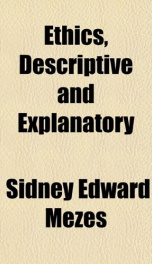ethics descriptive and explanatory

Purchase of this book includes free trial access to www.million-books.com where you can read more than a million books for free. This is an OCR edition with typos. Excerpt from book: § 6. The Methods of Ethics So far as is possible Ethics draws on other sciences for facts, just as they draw on one another. Jurisprudence probably furnishes more valuable facts than any other science, for it describes the actions that judges, who are generally eminent in training, ability, and knowledge, employ the power of the state to punish, repress, and discourage, and also the rights that they with like effectiveness protect. History, political, social, and religious, furnishes many facts, and many are furnished, to mention only the more helpful allies, by Sociology, Anthropology, Biology, and especially by Psychology, descriptive, morbid, genetic, and comparative. But it often happens that other sciences fail to investigate the facts that are most significant for Ethics, and then it is compelled to take up the investigation, making use, of course, of the approved method in each case. For instance, with all the activity of modern psychologists, the numerous books they have written either ignore conscience or give it but scant description, and even voluntary action they fail to treat, from some points of view most interesting to ethical students. Ethics must fill in these and other gaps, and in doing so must use the methods, introspection, experiment, etc., employed by Psychology. And what is true of Psychology is also true of Jurisprudence, Sociology, and History; and if it is, at present, less true of the other sciences mentioned above, that is because Ethics is as yet scarcely aware of the magnitude of the task undertaken. In short, in dealing with facts of each kind, Ethics must use the methods of investigation found effective by the sciences ordinarily dealing with them, and this means that many methods must be used, for the facts are very various. But Ethics is...
Users who have this book
Users who want this book
What readers are saying
What do you think? Write your own comment on this book!
write a commentGenre
if you like ethics descriptive and explanatory try:
Other books by this author
Do you want to exchange books? It’s EASY!
Get registered and find other users who want to give their favourite books to good hands!

